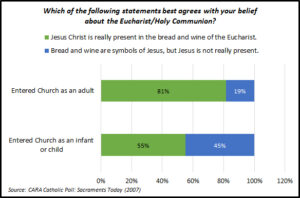
You know what one of the hardest parts of my ministry as an RCIA team member is? A catechumen hears something on the news about a poll that says, “X percent of Catholics no longer believe _____.” Or, “Some-huge-percent of Catholics disagree with the pope about _____.” Or “A big bunch of Catholics think it is okay to do _____.” And then this barely-evangelized new believer asks me if that’s true. What do I think?
It is not difficult to find people who openly disagree with core church teachings or practices who, nevertheless, self-identify as good Catholics. If you take opinion polls seriously, even devout parishioners might come away a little confused about what it means to be a good Catholic. Catechumens can be even more confused.
Fraternal correction or nonjudgmental acceptance?
Those of us who serve in initiation ministry sometimes react to this by offering doctrinal correction. To counter such errors, we might quote the Catechism or a papal statement to point out to the lax person the error of his or her ways.
And sometimes we react more like Pope Francis who said, “Who am I to judge?” Pope Francis even said that atheists are redeemed by Jesus. Of all the teachings of the church, the one that pretty much all of us—even lax Catholics—agree on is that Jesus is the Son of God. And the pope says that even if you don’t believe that core teaching, you are still redeemed by the God you don’t believe in.
So, then, how are we supposed to teach catechumens how to be good Catholics when it seems as though there are so many disparate ways in which people define “good Catholic”?
Learn to do what Jesus would do
In a previous set of articles, I talked about a catechesis that is “suitable” for catechumens. In this article, I want to focus on the Christian life. Part of the pope’s statement about atheists had to do with how they live. The pope said, “We all have the duty to do good.” Even the atheists. If the atheists are “doing good,” they are living elements of the Christian life, even if they don’t believe they are.
So it is even more important for the catechumens, who do have a belief in Jesus, to live a good life. The way they live is both a witness to the world and a key element of their own formation. As RCIA catechists, we have to teach the catechumens what living a Christian life looks like, and we have to be able to see some evidence of Christian living in each catechumen.
As RCIA catechists, we have to teach the catechumens what living a Christian life looks like.
Five steps for beginners in the Christian way of life
The Rite of Christian Initiation of Adults gives us five markers to look for. The rite says:
As [the catechumens] become familiar with the Christian way of life, and are helped by the example and support of sponsors, godparents, and the entire Christian community, the catechumens learn
- to turn more readily to God in prayer
- to bear witness to the faith
- to keep their hopes set on Christ
- to follow supernatural inspiration in their deeds, and
- to practice love of neighbor, even at the cost of self-renunciation (RCIA 75.2)
There is, of course, much more to Christian life. But this is the foundation. Without learning how to do these five things, the catechumens will have little chance of being able to take on the more mature disciplines of Christian life.
What used to keep me up at night
As an RCIA catechist, I worry that I’m not giving the catechumens enough. I’m not teaching them enough, I’m not supporting them enough, I’m not preparing them enough. Enough already! I have to remember that my one job is to prepare the catechumens to start the Christian life. The Catechism says
Baptism is the sacrament of faith. But faith needs the community of believers. It is only within the faith of the Church that each of the faithful can believe. The faith required for Baptism is not a perfect and mature faith, but a beginning that is called to develop. (1253; emphasis added)
There are two things I had to learn in order to do this kind of catechesis. First, I had to learn (or remember) that I am not Jesus. The salvation of the catechumens is not up to me. I have one job. Teach the catechumens how to live according to the five ways listed in the RCIA.
And second, I had to learn that PowerPoint and lecture, or video and handouts, or bringing in a guest speaker, is not an effective way to teach this kind of Christian living. The most effective way to teach the catechumens how to live as Christians is by example. I have to be a good example of each of those five areas of Christian living. And so do the sponsors. And so does the parish community.
A challenge for all of us
So here is my challenge to you, which is the same challenge I offer myself. The next time I encounter a catechumen, what one thing will I do that provides an excellent example of one of those five areas of Christian life?
It is not our job to combat the opinion polls and get all the Catholics in the world back on the path of sound doctrinal teaching. Our one job is to start the catechumens off on the right foot. If you can consistently provide examples of these five foundational areas of Christian life, you will be doing an excellent job as an RCIA catechist.









“It is not our job to combat the opinion polls and get all the Catholics in the world back on the path of sound doctrinal teaching.”
While it is not our job to get “all the Catholics…back on the path…” It is our job to answer questions that the Holy Spirit has placed on the hearts of the candidates. The Precat (inquiry) period is the time to do this. We encourage our candidates to ask all their questions during this time. Things that may be stumbling blocks for their journey. We must be able to present in a loving way the truth and beauty that is Catholicism unfiltered by what they have heard from the media, family and friends.
Can’t tell you how much I enjoy your articles. Makes me wish I were still actively involved. Thank you and all your team for doing all the workshops, both in person and online, that you are doing. I was so concerned that after Forum closed, no one would fill that gap. Blessings and more blessings to you!
Thanks Mickey! Your support means a lot to us.
I really liked your reference to Pope Francis’ comment about atheists. My parents were not believers, but they were good people who were there for others. And they admired Jesus as a human being.
So what is the point of being a Christian? I think it’s a public commitment to be a disciple of Jesus in our time and place and to be one with him and the community of disciples.
The five steps for beginning to live the Christian life are very good reminders.